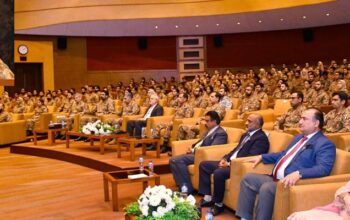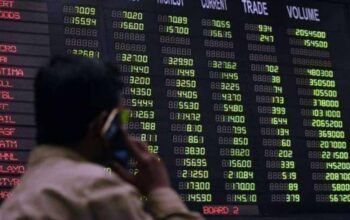By Staff Reporter
ISLAMABAD: Pakistan’s Supreme Court on Friday rejected the opposition Pakistan Tehreek-e-Insaf’s (PTI) claim to 39 reserved seats in the national and provincial assemblies, overturning a prior ruling and shifting the country’s parliamentary balance toward the ruling coalition.
A 10-member bench, led by Justice Aminuddin Khan, voted 7-5 to uphold a Peshawar High Court decision and dismiss PTI’s petitions. The verdict sets aside a July 2024 Supreme Court judgment that had briefly favored the party.
“[We] have dismissed all the usual petitions for detailed reasons to be recorded later,” Justice Khan said, delivering the short order. “All review petitions are allowed. [The] impugned majority judgment dated July 12, 2024, is set aside. Petitions filed by the SIC (Sunni Ittehad Council ) are dismissed, and the judgment rendered by the Peshawar High Court is reinstated.”
The verdict marks the latest twist in a bitter dispute over reserved seats for women and minorities, a battle that traces back to the chaotic February 8, 2024, elections. It also closes the door, for now, on PTI’s bid to reclaim its status as the largest party in the National Assembly, a prospect that had loomed since the court’s earlier ruling identified 39 of 80 members as rightful PTI candidates.
The reserved seats dispute has its roots in the fallout from PTI’s loss of its election symbol, a cricket bat, ahead of the 2024 polls. On January 13, a three-member Supreme Court bench upheld an Election Commission of Pakistan (ECP) decision nullifying PTI’s intra-party elections, forcing its candidates to run as independents. Eighty of them won seats and later aligned with the SIC to claim reserved seats—a maneuver the ECP rejected, setting off a legal firestorm.
The Supreme Court’s July 12 ruling had offered PTI a reprieve, with eight of 13 justices affirming the party’s claim to 39 seats. But the National Assembly has yet to act, and the ECP has cited procedural hurdles. The Pakistan Muslim League-Nawaz (PML-N), Pakistan Peoples Party (PPP), and ECP filed review petitions, arguing the decision upended electoral norms, a stance the court embraced Friday.
Justice Mandokhail, while maintaining his original order on the 39 seats, allowed review petitions and adjusted the July judgment to cover 41 seats, according to the short order. The reserved seats will now go to other parties, including PML-N, PPP, and Jamiat Ulema-e-Islam-Fazl (JUI-F), bolstering their legislative clout.
PTI’s reaction was swift and scathing. “The funeral of constitutional, judicial traditions, and justice,” the party said in a post on X. For PTI, led by the jailed former prime minister Imran Khan, the ruling is a crushing blow to its parliamentary ambitions.
PTI called the court verdict “unjust and a misinterpretation of the Constitution” and signaled a new phase of political confrontation. “The darkest day in the country’s constitutional history.”
Speaking to a private television shortly after the ruling, PTI Chairman Barrister Gohar Ali Khan voiced his frustration. “We are deeply disappointed… the decision is unfair, and the Constitution has been wrongly interpreted…The reserved seats rightfully belonged to PTI.”
Barrister Khan, however, acknowledged the finality of the judgment. “We cannot take this matter to any other court after this review judgment. We will raise the issue in and outside the parliament.
The Friday session saw early tension when Justice Salahuddin Panhwar recused himself after SIC counsel Hamid Khan challenged the bench’s makeup, citing judges appointed post-26th Amendment.
The recusal, which reduced the Constitutional Bench to 10 members, sparked a fiery clash between the justices and Khan, amplifying tensions in a legal battle that could crown the former jailed prime minister Imran Khan’s PTI as the largest party in the National Assembly.
The session under the gavel of Justice Khan, laid bare the fault lines in Pakistan’s judiciary and politics. Justice Panhwar opened the day by addressing Khan’s objection from the previous hearing. “Hamid Khan raised an objection to the inclusion of judges in the bench who came to the Supreme Court after the 26th Amendment,” Justice Panhwar said, noting he was among those targeted. The 26th Amendment, passed earlier this year, altered judicial appointment processes, fueling debates over its impact on pending cases. “Public trust in the judiciary is essential,” Justice Panhwar continued. “It is because of these objections that I cannot sit on this bench.”
Though he expressed regret. “I was hurt by his remarks; we’ve worked together since 2010.” Justice Panhwar insisted the matter wasn’t personal. Khan praised the decision, but Justice Aminuddin shot back. “This is a result of your conduct. We gave you respect, that’s why we are listening to you, otherwise we were not under any obligation to hear you.”
The exchange grew testy. “Giving respect is what gets you respect,” Justice Mandokhail told Khan. “Whatever respect you have today is because of the Supreme Court.” When Khan accused the justice of anger, Justice Mandokhail revealed a personal sacrifice. “I have skipped my mother’s funeral to be here and you are joking.” He gave Khan 10 minutes to argue. “I know how to do my job, you be careful with your words.”
Justice Aminuddin overruled Khan’s objection and urged him to proceed, but not before Justice Mandokhail reminded him that the SIC had appointed Faisal Siddiqui as its lawyer, not Khan. “We consider you a good lawyer,” Justice Mandokhail said, “but what you are doing right now is not the work of a good lawyer.”
The reserved seats saga traces back to the chaotic February 8, 2024, elections. On January 13, a three-member Supreme Court bench upheld an ECP decision nullifying PTI’s intra-party polls, stripping the party of its election symbol, a cricket bat. Forced to run as independents, 80 PTI-backed candidates won seats and later joined the SIC to claim reserved seats. The ECP rejected the move, prompting the Supreme Court challenge that led to the July 12 ruling.
PTI counsel Salman Akram Raja defended that decision on Friday, invoking the Sindh High Court Bar case as precedent. “After the emergency imposed on November 3, 2007, the Supreme Court declared it unconstitutional, and all actions taken in its aftermath were annulled,” he said, arguing the court has a duty to protect constitutional norms.
Raja pointed to past elections, 2013 and 2018, where parties received reserved seats proportional to their general seat wins. “In Khyber Pakhtunkhwa, a party [PTI] that secured 83% of the general seats was allotted zero reserved seats,” he said, calling it an aberration.
The bench pushed back. Justice Mandokhail asked. “Suppose Imran Khan, Nawaz Sharif, Asif Zardari decide to contest independently, how can we prevent them?” Justice Musarrat Hilali noted that losing an election symbol doesn’t erase a party’s registration, while Justice Muhammad Ali Mazhar flagged “a lack of coordination within the PTI.”
Justice Mandokhail added that the 39 MNAs who declared their PTI affiliation “were more sensible”, a point Justice Hilali reframed as “a higher tolerance for pressure.”
Khan, meanwhile, recounted the election symbol debacle. “It was a Saturday, a holiday, but the case was heard until 11 p.m.,” he said. “At midnight, our election symbol was taken away from us, and the deadline for symbol allotment passed.” He accused the ECP of favoritism, noting the Awami National Party (ANP) got extra time despite skipping intra-party polls.
Justice Mazhar countered that PTI had years to refine its processes: “Your party constitution is better than others.” Khan quipped, “It seemed the PTI was punished for drafting a better constitution.”
Copyright © 2021 Independent Pakistan | All rights reserved




